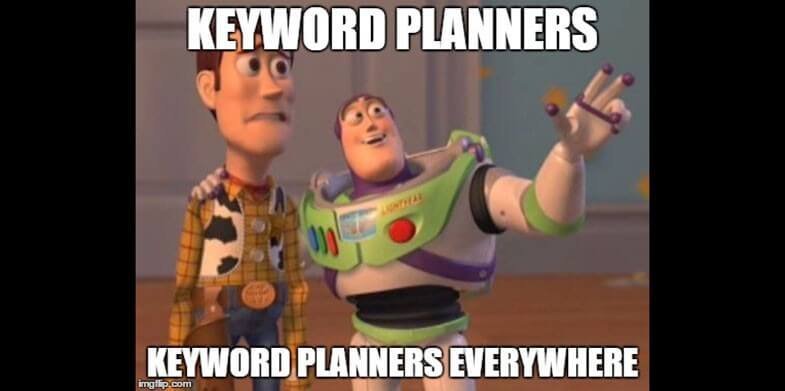You have most likely stumbled upon this post because you own a website & you’re done with hard labor, created a design & put some token content on there. Now you plan to post some quality content, but as a precautionary measure you want to look out for things that can increase your blogs traffic. Well if that’s the case, then you’ve come to the right place.
In the later part of the article we will go one by one explaining why it’s a very good idea to do a comprehensive keyword research before you post quality blogs. I will try to explain here a little about Keywords, and what the whole fuss about.
Keywords are a way for you to tell the search engine crawlers what the content is about, or your website is about for that matter. Now how does that sorcery works – well, frankly Google keeps changing their guidelines in order to keep tabs on abuse of the service. So there is no hard & fast rule, well actually there is one, don’t stuff your content with keywords. You do that and your website will get penalized. SO my advice, go with long tail keywords, like for instance if you want to rank for “Pay Day Loans” (although that whole 5 keywords per article thing doesn’t work anymore) – then you should use a Title that says How to Apply for Pay Day Loans? OR Why Pay Day Loans Are Such A Pain In The Ass? Well, you can go as creative with it as you want – what you should focus on is that it shouldn’t be a standalone keyword. Ideally, you should use a long tail keyword in title of the article & you’re gold.
I get it, it’s not that easy, that’s like a lot of work, first choosing a keyword & then planning a whole strategy to rank for it. There are somethings that you should keep in mind. That whole, I have this website & I want to rank for this keyword in 8 weeks doesn’t work anymore. Gone are the days when you would post a couple of articles with the keyword in it & build a couple of links & voila! The advent of social medias has changed the internet for good. Services like Facebook, Twitter, LinkedIn, Yelp etc, are not just services but these are search engines, which implies that you need to post content there, which is also optimized or entails the long tail keywords we were discussing earlier- capiche? I hope you understand this
So let me get started by telling you what most would consider to be the reasons keyword research is important:
1) Know Thy Target Audience
So once you’ve your target audience pinned down, it helps with a lot of things. You start profiling the trends of that particular segment of society & based on that devolve a strategy. You can use tools like Keyword Planner. You write about things that are of high value and interest to potential users of your tools, services or products. You make sure that your content isn’t only optimized but it’s engaging. Therefore the best way to figure that out is to look for keyword combinations that your target audience are going to search. If you cannot wrap your head around your target audience then it is time for you to consider a different industry. This brings us to the next point:
2) Helps Optimize Your Site for Search Engines
Yeah I know what you’re thinking, you don’t say bro! Well this one of course goes without saying & more like stating the obvious but the biggest mistake that people make is that they feel, just stuff their content with relevant keywords on the website and that should do the trick! WRONG…The website isn’t the only medium for you to optimize for the keywords or search engine. The SEO 4.0 requires that you have a very thriving presence on all relevant social media platforms. You do that and you’re golden, especially when you put optimized information there. AND I said relevant social medias because if you’re a service provider than you should to some degree control what people are saying on Yelp. At Yelp, you not only need favorable reviews but the content there will be helpful if its optimized. The SEO game is rigged, so the sooner you make peace with it the better. There are no losers here, as long as you play your cards right AND don’t be a sore loser & start attacking your rivals’ sites – You know who you’re! Overall, keywords tell search engines what your website is about. If you’re targeting a specific audience you better be sure to include and optimize these keywords in the most natural way
Also See: 10 Insightful SEO Techniques to Follow in 2015
3) Lure Search Engine Crawlers & Target Audience
Once you do thorough research, it helps lure not only search engine crawlers and help you get indexed for the intended keyword but in doing so you cater to your target audience. One of the best places to look is right on the search engine. Use tools like SEMRUSH to seek out what kind of links and things competitors are doing to rank for particular key words. Providing useful & potent content to your target audience is a very important metric, because it leads to greater engagement with the content. Search engines favors content with the highest interaction, the more social shares & comment postings, the higher the value of your content. So check out social media and see what people are talking about. These are good keywords to focus on.
4) Narrow Down 1st Priority & 2 nd Priority Keywords
If you do thorough Keyword research to choose for your SEO campaign, it helps you vet the keywords that you should focus for higher conversion. It also helps you classify keywords with higher competition. It becomes easier to determine the resources you plan to allocate to that particular keyword. If that’s a very high competition keyword that you wish to rank for, then you better fasten that belt & take a very calculated risk – keyword research in this case comes very handy and will save you money in the long run.

5) Two Birds with One Stone – Onsite & Social Media Optimization
After pinning down the keywords that you plan to target. It becomes very easy for you to formulate your onsite optimization strategy plus you can also better focus on chunks of offsite optimization i.e. Social Media Optimization. Like the name/URLs of your Facebook pages or twitter handles & Google Plus pages, I know no one use G+ but its good for your SEO, so keep posting there!
6) Explore Variety of Options to Choose From
It might not be surprising that the keywords that you plan to pursue before research & after research are very different. People have different ways of forming sentences, the grammar may not be correct all the time & the volume of traffic will be humongous. It might look like that this phrase will be a real crowd puller but the traffic volume will be pretty low. This teaches us that its very important to do a thorough research over the keywords that you wish to optimize your site for. Cause you never know, the horse you’re betting isn’t even supposed to run for another season. Ergo, choose wisely & do your homework.
Also Look: Old SEO Methods You Need to Stop
7) Helps You Budget /Your Campaign
So of course, at the end of the days it all comes down to the kind of money you can spare for this campaign. Usually with SEO its Go Big or Go Home, but we don’t live in a perfect world and not everyone has a stash of cash lying around to throw at something that may or may not work. So when you’re in a predicament like this, you choose wisely. When you’re using keyword research tools, it will be tell you which keywords are the one’s which other are optimizing their sites for. These keywords are high competition keywords, hence difficult to rank for & difficult here means expensive! So what’s the trick? Go for a careful combo of high & low competition keyword.
In closing, there are many different variables and techniques one could use to better target the industries customers in which they reside. Take your time and do your homework it will save you time and money in the long run. After all research is key to seeing what the risks and rewards are. Try some of our methods and watch your keywords rankings rise to the top.


